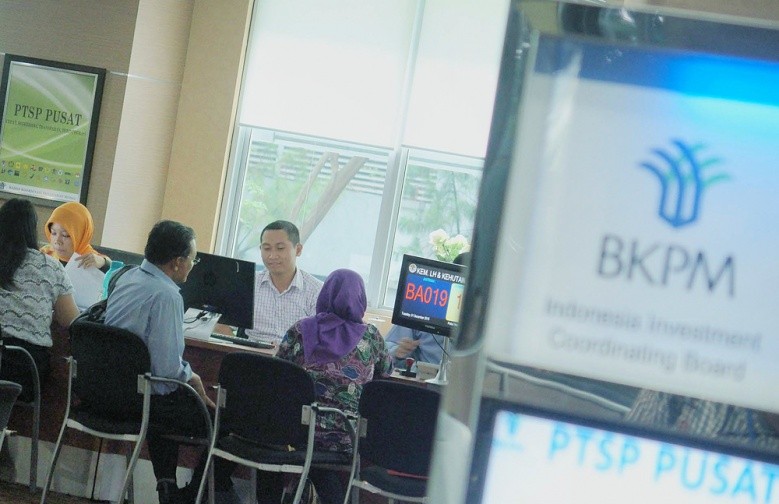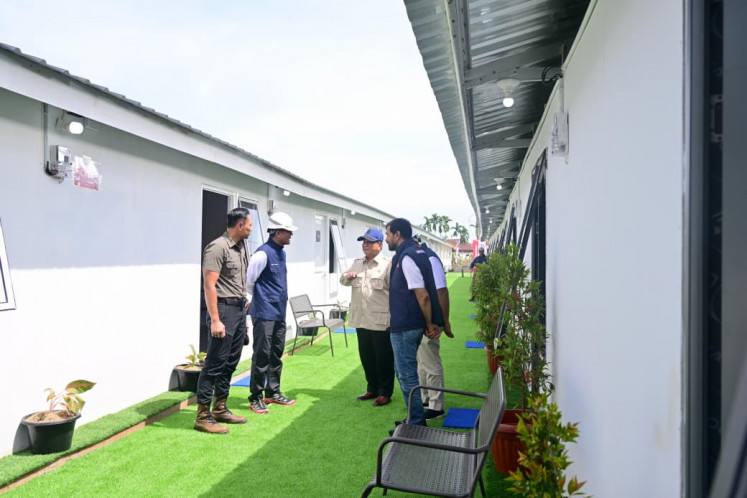Popular Reads
Top Results
Can't find what you're looking for?
View all search resultsPopular Reads
Top Results
Can't find what you're looking for?
View all search results2020 Economic Outlook: Corruption continues to hinder investment
Change text size
Gift Premium Articles
to Anyone
T
he full scale of United States investment in Indonesia is not often evident from official government figures. Statistics from the Investment Coordinating Board (BKPM) only attributed US$7.78 billion worth of investments to the US from 2013 to 2017. This is far from a complete picture.
First, it does not account for investments coursed through the regional headquarters of multinational companies, which are typically based in countries such as Singapore or Hong Kong and cover a wide number of sectors. Second, it does not include the upstream oil and gas sector, which has traditionally been one of the major destinations for US capital.
Our research found that once estimated upstream oil and gas activities are taken into account, US companies invested at least $36 billion into Indonesia from 2013 to 2017 — almost five times the official government figure. This also means the US was likely the leading source of foreign direct investment (FDI) in Indonesia during that five-year period. Singapore ranked as the second-largest investor with $34 billion, followed by Japan with $20.7 billion, United Kingdom with $14.3 billion and China with $9.4 billion.
Beyond the numbers, interviews with government officials and industry leaders also show that US companies contributed far more than investment dollars. Directly and indirectly, they have served as catalysts for the growth of new sectors, provided invaluable training and knowledge and assisted countless entrepreneurs. They empower local companies, ranging from small and medium enterprises that can take advantage of innovative small business solutions offered by digital platforms.
Despite the significant value of existing investments by US companies, the reality is that they could be doing much more. In 2013, we reported on the basis of interviews with US companies that roughly $61 billion worth of investments were planned for Indonesia in the next three to five years. The $36 billion investment figure for 2013-2017, unfortunately, falls significantly short of that. We conducted dozens of interviews to try to understand why this is the case.
Our analysis resulted in a key insight: Though the government has been deregulating to attract more foreign investors, most improvements have only been in the entry phase. Once the permits are issued and the businesses are set up, the usual operational and even more fundamental problems remain lack of skilled workers, contract and regulatory uncertainty, corruption preventing further investment and painting a discouraging tale for potential investors.
President Joko "Jokowi" Widodo himself recognizes this, emphasizing in his inauguration speech in October that the government will make the development of human resources its main priority. We are hopeful this includes a reform of the country’s outdated labor law, which restricts the ability of companies to manage their workforce due to costly procedures for layoffs and a politicized minimum wage structure, consequently affecting productivity.
Indonesia’s productivity-to-cost ratio was the lowest among five ASEAN countries (Indonesia, Malaysia, Thailand, the Philippines and Vietnam) in 2017, largely because growth of labor productivity in the four other countries balanced out the increases in their respective minimum wages. We note that the government has issued a number of tax holidays and other incentives to attract FDI, but, as the World Bank pointed out in a recent report, none of these are enough if operational issues are not addressed.
Among these issues AmCham has been told repeatedly by investors is the high cost of doing business in Indonesia, mainly because of logistics and land acquisition, but also due to persistent corruption, including demands for “facilitation” payments, which, even if they are not paid, can result in significant delays. The President has also ordered his ministers to simplify, cut and trim all regulatory constraints, but a mindset that recognizes the need for long-term regulatory certainty is required to attract major investments that will stay in the country for decades.
The country remains mired in the practice of introducing new laws and regulations that can significantly change the way companies must run their businesses, including demands for greater local content or rules that require taking on local partners. It is time-consuming and expensive to cope with new regulations that sometimes are issued without sufficient public consultation. The cumulative effect of these practices is to paint a less attractive picture of Indonesia as an investment destination.
President Jokowi launched his second term in office with a strong focus on bureaucratic and economic reform and an ambitious goal of making Indonesia one of the world’s top five economies by its centennial in 2045. To contribute to the government’s efforts, we would like to add our learnings from our assessment of the challenges faced by investors in Indonesia today.
• Require public consultations prior to the issuance of regulations. Governance experts have long contended that a systematic and effective system of public consultations not only leads to better regulations but also improves compliance and reduces enforcement costs.
• Create a dedicated government body for regulatory impact analysis. Having a government body dedicated to this, according to the World Bank, is recognized by most developed countries as a key instrument to improve the quality of regulatory decision-making and can help to substantially reduce unforeseen problems or unintended consequences of otherwise well-intentioned regulations. This includes mapping of potentially overlapping regulations.
• Improve coordination and communications between government bodies. Across various industries, this issue is consistent. Even if a regulation is good, inconsistent implementation and communication between government bodies can diminish its potential impact.
• Focus on long-term goals over short-term gains. A common observation by industry players and analysts alike is how policymaking in Indonesia is often “reactive” to needs and issues, instead of being a well-thought-out plan for the future. With the government focus on 2045, we are hopeful that long-term planning will guide policymaking moving forward.
Armed with a fresh mandate, the President’s second term has the opportunity to put in place meaningful reforms that could guide Indonesia out of the middle-income trap before 2045. To do this will require vision, political courage and a willingness to challenge corrupt or inefficient practices, special interests and entrenched bureaucracy.
***
This article was excerpted from the 2019 United States-Indonesia Investment Report of Amcham Indonesia and the US Chamber of Commerce titled Making an Impact which was issued last month.










